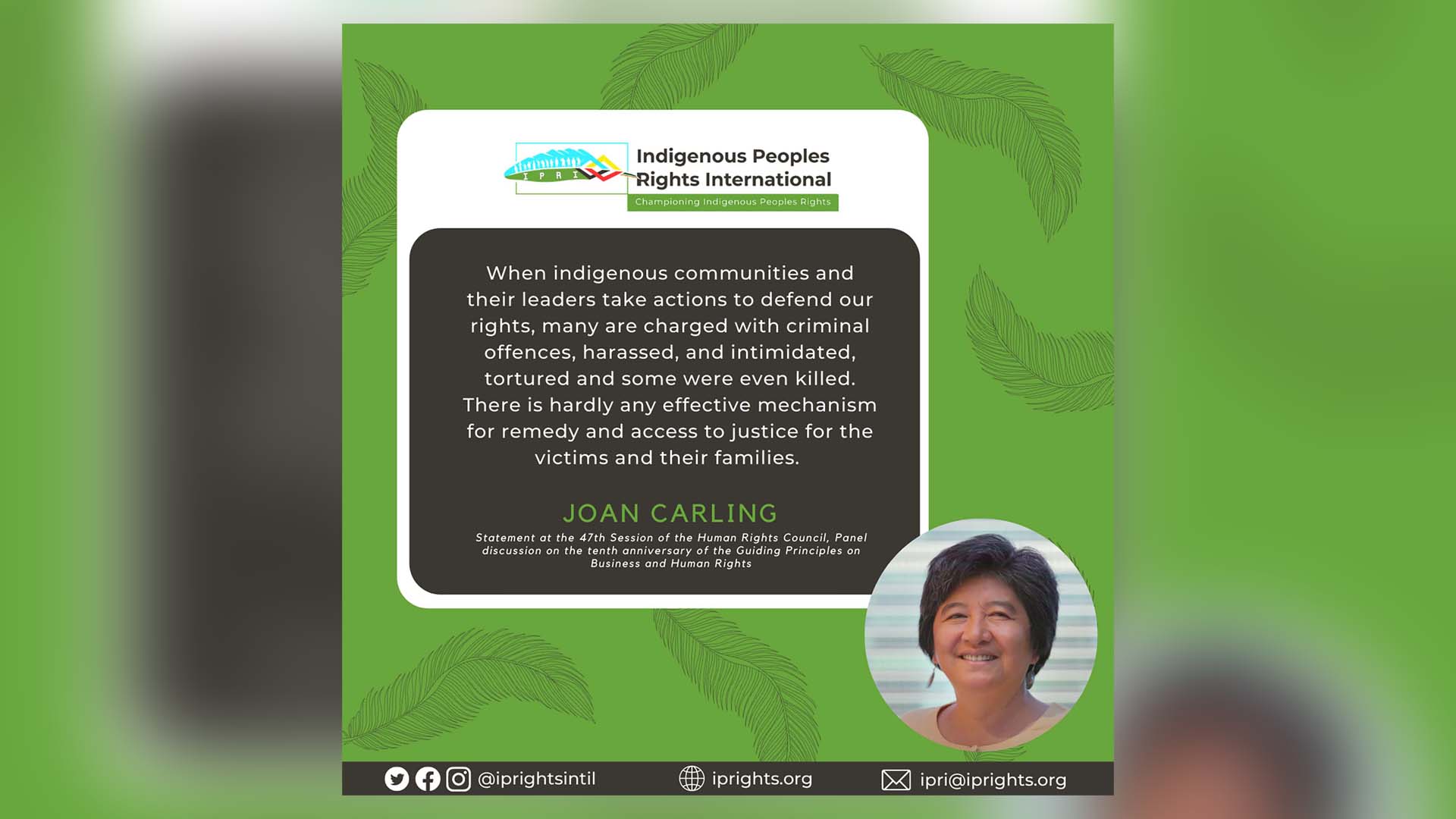47th Session of the Human Rights Council
Panel discussion on the tenth anniversary of the Guiding Principles on Business and Human Rights
29 June 2021, 4 to 6 p.m.
Room XVIII, Palais des Nations, Geneva
Statement by Joan Carling, Co-convenor of Indigenous Peoples’ Major Group for Sustainable Development and Executive Director of the Indigenous Peoples Rights International
Indigenous Peoples are often adversely impacted by business operations mainly in relation to our lands, territories, and resources. Thus, the development and implementation of the UN Guiding Principles on Business and Human Rights—the UNGP - provides additional tools and mechanisms for the respect and protection of indigenous peoples’ rights.
The ten year of UNGP implementation has gained momentum in raising global awareness and attention to the concerns and recommendations of indigenous peoples through our participation in global and regional forums, collaborative actions with our allies and advocates, and recommendations by relevant UN bodies.
One of the strategic outcomes of the UNGP implementation is the development of human rights due diligence policies and guidelines, including the requirement for the Free Prior and Informed Consent of Indigenous peoples by business and financial institutions such as the World Bank Group. The key industries that have incorporated FPIC include the extractive industries, palm oil, timber and supply chain of food and beverages. The China Chamber of Commerce of Metals, Minerals and Chemicals Importers & Exporters (CCCMC) states that ”We will not engage in or tolerate extracting resources or otherwise benefiting from land where the free, prior and informed consent of local communities and indigenous peoples has not been obtained, including those for which the extractor holds a legal title, lease, concession, or license”.
These milestone commitments adhere to the minimum standard for the engagement of business with indigenous people which should be aligned with the UN Declaration on the Rights of Indigenous Peoples and the ILO Convention 169 on Indigenous and Tribal Peoples. It is now crucial and urgent for these business actors to move from policy to implementation and set good practices to make the positive changes on the ground in the next decade of implementation.
A landmark regional agreement of States in Latin America and the Caribbean on environment governance—the ESCAZU agreement - has now entered into force and is expected to enable access to justice for many indigenous communities and leaders defending their environmentfrom business operations. Further, the current process in the European Union in developing mandatory human rights due diligence regulation for European companies, including a commitment to respect the rights of indigenous peoples is a ground-breaking action in the implementation of the UNGP. We recommend for this legislation to be adopted and implemented as well as the Binding Treaty on Business and Human Rights with strong accountability mechanisms in the next decade of UNGP implementation.At the national level, indigenous peoples were mentioned in 13 National Action Plans andseveral States have also started the process of legal reforms in recognition of the rights of indigenous peoples. National Human Rights Institutions have played vital role in promoting the UNGP; raising attention to human rights violations, and facilitating inclusion of indigenous peoples in multi-stakeholders’ processes.
However, the majority of indigenous peoples, especially at the grassroots level, remains unaware of the UNGP and of their rights. 86% of indigenous peoples are in Asia and Africa, of which majority are not legally recognized as indigenous peoples with collective rights. This is a major barrier in the implementation of the UNGP.
In fact, the past years have been marked with persistent and alarming violations of the rights of indigenous peoples linked to business in many developed and developing countries. These cases were largely in relation to land and resource-grabs relating to extractive industries, energy development and agri-business. When indigenous communities and their leaders take actions to defend our rights, many are charged with criminal offences, harassed, and intimidated, tortured and some were even killed. Further, there is hardly any effective mechanism for remedy and access to justice for the victims and their families. Even undercurrent COVID 19 pandemic, many corporations continue or are even expanding their harmful operations; taking advantage of the lockdowns and restrictions while affected indigenous communities were not able to protest or defend our resources.
As we enter the next decade of the implementation of the UNGP, it is important to address the barriers. The respect and protection of our rights require the legal recognition and protection by States of our rights to lands, territories, and resources, to cultural integrity and to selfdetermination. This will provide the right framework for business and enable the proper implementation of human rights due diligence including FPIC that is not simply a procedural requirement. The community- driven processes through the adherence to the FPIC protocols and guidelines developed by indigenous peoples should be fully supported as a constructive and respectful approach for States and Business to engage with indigenous peoples on the ground for the next decade of UNGP implementation.
The establishment of effective mechanisms for indigenous peoples’ meaningful participation and inclusion in business-related processes, including in the NAPs, in trade and investmentpolicies and targets; and business projects under private-public partnerships is imperative. Likewise, effective mechanisms for access to remedy and justice should be given priority to strengthen the accountability of states and business.


%2020.49.20.png)
